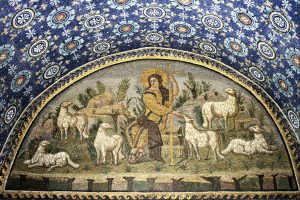Thoughts on Sunday’s Lessons for May 3, 2020
First Reading: Acts 2:42-47
The fourth Sunday of Easter is traditionally called “Good Shepherd Sunday,” as the readings for the day draw our attention to sheep and shepherds as metaphors for God’s protective love.

The Good Shepherd (Fifth century CE), mosaic in the mausoleum of Galla Placidia, a UNESCO World heritage site in Ravenna, Italy. (Click image to enlarge.)
Our first reading continues the Acts of the Apostles’ narrative of the spirit-filled church after the first Pentecost. It tells us how that infant flock lived in loving, sharing community, selling all their possessions and distributing the proceeds to any who had need. Following the example set by Jesus, they recognized the joy and challenge of taking the good news of the Gospel to the world.
Psalm: Psalm 23
If you’re scratching your head and thinking that we just recently read the 23rd Psalm, there’s a reason: It was the Psalm we heard on the Fourth Sunday of Lent, just six weeks ago. In time of trouble and of fear, the 23rd offers comfort. To view it in a new way, try reading it in context with the psalm just before it, Psalm 22, one of the most desperate hymns of lament among all the psalms. In the 22nd Psalm the poet utters the hopeless words that Jesus will later repeat on the cross: “My God, my God, why have you forsaken me?” Still, he calls on God in trust and hope. Then we turn the page and find comfort in the 23rd’s assurance that our loving shepherd will watch over us and protect us all the days of our lives.
Second Reading: 1 Peter 2:19-25
Prepare for a troubling surprise if you turn back and look at the verses just before this reading: This portion of this letter written in Peter’s name was addressed to slaves. It demanded that they accept the authority of their masters, even if those masters treated them harshly. Nowadays we struggle with the idea of Bible verses that seem to support slavery (not to mention other latter-day hot-button issues). Indeed, these and similar verses were once used to justify slavery as acceptable to God. Perhaps it’s more useful for us to take this as general advice to all who suffer, remembering that Jesus suffered and died unfairly, having done no wrong. Like lost sheep, we suffer, but we know joy when we return to Christ, our shepherd and guardian.
Gospel: John 10:1-10
In the verses just before these in John’s previous chapter, Jesus had been arguing with a group of Pharisees who were angry because he restored a blind man’s sight on the Sabbath. As the new chapter begins here, Jesus seems to be continuing that conversation with the Pharisees as he draws a clear distinction between the good shepherd who cares for the sheep and thieves who break in to steal the sheep. Jesus himself is the gate to the sheepfold itself, he tells them; and he is the gatekeeper too, the protective guardian whose familiar voice reassures the sheep and calls each sheep by name. The gate opens to allow the protected ones to enter, then closes to bar those who would steal, kill, and destroy the beloved sheep. In the next verse after today’s reading, Jesus will declare, “‘I am the good shepherd. The good shepherd lays down his life for the sheep.”
